沉默的大多数16页PPT
红白歌会介绍
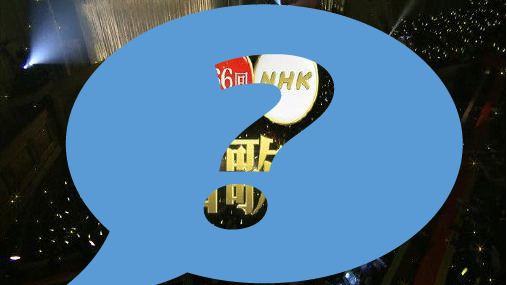
每年的最后一天(12月31日) 【第1部】19:30~21:25 【第2部】21:30~23:45(日本标准时间)。 【第1部】和【第2部】之间的5分钟播放当年最后的新闻,而卫星高画质放送台 则播放其他节目)
开播初期,该节目的收视率非常高。1963年曾创下81.3%的历史最高收视率。后因形 式比较单一,“红白歌会”的人气渐低,收视率不断下降,从1984年的78%滑落到 2005年的42%。2000年以来,“红白歌会”的收视率一直徘徊在50%左右,2004年更 是跌破40%。最低收视率是2015年的39.2%。尽管如此,收视率还是在“电视剧、综 艺节目”类的年度排名前五名。 历届红白收视率 最高视聴率 81.4%(1963年第14回) 最低视聴率 39.2%(2015年第66回)
红白歌合战的第一届是在1951年1月3日举办。当时只在收音机播放,使用名字 也并非如今所用的“红白歌合战”,而是“红白音乐试合”。 由于大受好评,所以1952年以后也继续举办。从1953年的第3回开始在电视 试播,并决定从这一年起将“红白歌合战”作为一项辞旧迎新的重要活动。 当年12月31日举办第4届,以后便定为每年12月31日举办。从第4届开始加入 现场观众。 东京涩谷的NHK音乐大厅 旧NHK放送会馆 东京宝冢剧场
演歌
AI 《大家都是英雄》 绚香 《三日月》 E-girls 《Dance With Me Now!》 生物股长 《Sakura》 石川百合子 《超越天城》 市川由纪乃 《心的重叠》 宇多田光 《花束献给您》 AKB48 《梦想红白选拔SP》 大竹忍 《爱的赞歌》 欅坂46 《沉默的大多数》 香西熏 《喜欢 真田丸SP》 坂本冬美 《夜樱的七个》 椎名林檎 《青春的瞬间 From Neo Tokyo 2016》 岛津亚矢 《随波逐流》 高桥真梨子 《对不起》 天童芳美 《你的花道》 西野加奈 《Dear Birde》 乃木板46 《再见的意义》 PUFFY 《PUFFY 20周年红白特别版》 Perfume 《Flash》 松田圣子 《如蔷薇般绽放 如樱花般飘散》 水森熏 《越后水原 百鸟飞翔》 Miwa 《结 由》
《历史学科素养和历史阅读写作——方案设计和实施汇报》20161014-清华附中张馨月.pptx
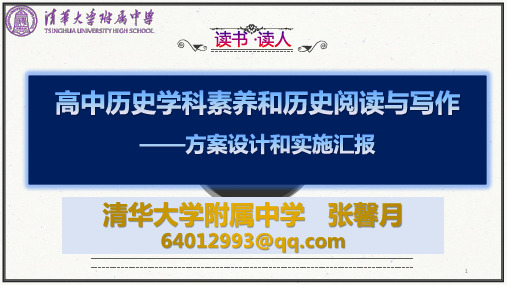
第一周 导读
教师介绍书籍;介绍相关模块知识《明治维新》《戊戌变法》《孙中 山》;学生课后阅读《第一章 剿夷与抚夷》
第二周:学法指导
历史阅读方法指导讲座;学生课后阅读《第二章 洪秀全与曾国藩》
第三周:学生写作
学生课后阅读《第三章 自强及其失败》,并开始准备写作。
四周阅 读和写 作过程
第四周:学生作业和课堂交流
《海淀教育》2014
《校本课程研究性学习的可行性研 究》韩星主编《思考圆明园》,上海科技出版社,
2016年即将出版
设计内容(一)
教学目标:
高一通识教育培养: *阅读:通史类著作; *写作:培养基本阅读能力和读书摘要写作; 高二文科生能力提高培养: * 阅读:通史类和专题类著作、文章;同主题对比阅读。 * 写作:培养历史学科思维方式;模仿主题写作
设计内容(二)
开展形式:
课堂外
课堂内
师生课 外阅读
课堂内 课堂外
学生作 业交流
学生历 史写作
教师讲 授国家 课程
设计内容(三)
选书计划:
配合国家课程各个模块的教学内容;(兼顾知识关联度)
以中国史为主,兼顾世界史;(兼顾学生对中国史熟悉度)
专业著作又通俗易读,非大部头。(5万—10万字左右)
十月份:第二三单元
关于西周女性所 处的社会地位
西周的社会概况
32
33
优秀作业
高1605 毕某、姚某-读书摘要 张某-摘要(文笔成熟) 金某-西周社会四个等级 海某-读书摘要 胡某-周朝女性地位 (史料整理和独立思考) 王某-文笔极成熟 刘某-西周兴没 何某-读书摘要和笔记 (超额完成任务) 何某-西周农业和政治 刘娅萱-封建词释义
沉默的大多数佳句赏析-概念解析以及定义

沉默的大多数佳句赏析1.在喧嚣的世界中,总有一些声音默默无闻,却是最动人的佳句。
2.沉默的大多数佳句,如同一汪清泉,细水长流,深深触动人心。
3.有些话语虽不热烈激昂,却在心灵深处留下无法磨灭的印记。
4.在风平浪静的日子里,会更加珍惜那些平淡无奇的佳句。
5.每一个人,都值得拥有一段专属于自己的佳句,就像每个人都值得拥有自己的故事。
6.有时候,不经意间的一句话,却像一粒种子,在心田生根发芽。
7.人生如诗,而那些沉默的佳句,正是诗中最美的句子。
8.每一个佳句,都是一颗闪耀的星星,照亮着我们前行的道路。
9.默默无言的佳句,才是最深刻的,最动人的。
10.在生活的繁花盛开中,总有一些佳句静静地绽放,不张扬,却永恒。
11.佳句如同一缕清风,吹散了心中的阴霾,让人心旷神怡。
12.当我们沉浸在佳句的海洋中,会发现内心似乎变得更加丰盈。
13.每一个佳句,都是作者内心深处的一声叹息,一份真挚。
14.那些不起眼的佳句,反而更能触及人心,留下深刻的烙印。
15.佳句犹如一朵盛开的鲜花,散发着迷人的芬芳,引人驻足。
16.在阅读的世界里,那些佳句犹如璀璨的星辰,照亮了我们孤寂的心灵。
17.佳句是文字的精华,蕴含着作者对生活的独特感悟。
18.我们总是在寻找那些热烈激昂的文字,却忽略了那些平凡而沉静的佳句。
19.在低调的文字中,不经意的一个转折,就是一段令人感动的佳句。
20.默默无闻的佳句,是文学的珍宝,也是我们灵魂的慰藉。
21.沉默是唯一的回答,因为它可以让人明白真实的自我。
22.大多数时候,最动听的声音都来自于沉默的大多数。
23.在喧嚣的世界里,默默无言的人往往是最温暖的存在。
24.大多数时候,沉默胜过千言万语。
25.沉默的大多数是所有阳光下最耀眼的存在。
26.人生不只有阳光,沉默也可以如阳光一样温暖人心。
27.在沉默中,那些被忽略的细节才能显现出真正的价值。
28.有时候,最美的表达就是沉默。
29.世界上最平凡的人里,往往隐藏着最珍贵的品质。
沉默的大多数-优质课件
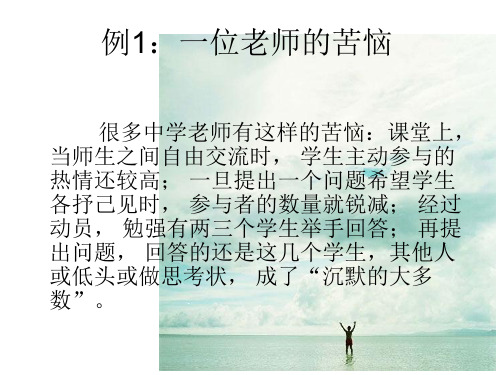
(1)“学习中等”掩盖了ቤተ መጻሕፍቲ ባይዱ生学习中的各种问题。
(2)表现平平、没有特长,很多时候也不一定是 学生本身的问题。
(3)中等生的听话、循规蹈矩只是在长期被忽 略之后的一种退缩。
“表达本身比表达的内容更有意义”
南朝刘勰说: “一言之辩,重于九鼎之宝; 三寸不烂之舌,强于百万之师。”
二、让“沉默的大多数”活跃 ———班主任管理方式的转变
例2:“优秀班主任”
一个优秀班主任说,他的班级自习纪律特别好。 纪律好的标准是什是安静了。有人说,如果学生 遇到问题想问同学或老师怎么办?允许学生之间 讨论吗?他说:本来讨论问题是很好的,但是难 免有学生趁机谈话,影响班级纪律,于是就只有 要求所有学生自习课一律不能说话。于是班级纪 律很安静,学校检查评比印象很好,班主任工作 经常得到学校的表扬,于是一个优秀的班主任诞 生了。但是,学生就我们的教育过程中失去了锻 炼表达能力的机会。于是有人说,是教育制造了 “沉默的大多数”。
是独特的、有价值的。多与学生沟通、交 往是学生学习积极性提高的重要保障,多用
爱心感化他们。爱是教师对学生进行教育 的重要动力,也是学生学习的重要能源。缺
少教师关爱的学生在学习中往往学习动力 不足,学习被动。
华东师范大学的李政涛曾经从生命角色生成和丰
富的角度论述过教师给学生提供表现机会对学生 生命发展的意义:“学生的生命发展,是以角色表演 为基础,在表演和观看中实现的。”“当教师拒绝
例1:一位老师的苦恼
很多中学老师有这样的苦恼:课堂上, 当师生之间自由交流时, 学生主动参与的 热情还较高; 一旦提出一个问题希望学生 各抒己见时, 参与者的数量就锐减; 经过 动员, 勉强有两三个学生举手回答; 再提 出问题, 回答的还是这几个学生,其他人 或低头或做思考状, 成了“沉默的大多 数”。
沉默的螺旋理论
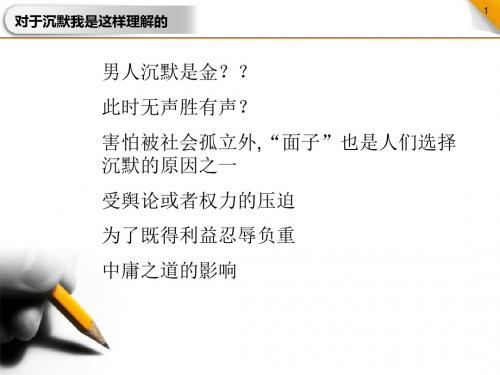
民意:为了避免被孤立而在公共场合表达的态度 或行为
7
沉默的大多数
• 由于媒介的作用,事实的真相往往被无限 的放大或缩小。很多时候人们无法改变现 实,却又不想向现实缴械投降,沉默便成 了多数人的选择。
• /n/2012/1221/c 212785-19976336.html
对于沉默我是这样理解的
1
男人沉默是金??
此时无声胜有声?
害怕被社会孤立外,“面子”也是人们选择 沉默的原因之一 受舆论或者权力的压迫 为了既得利益忍辱负重 中庸之道的影响
沉默螺旋理论的概念
2
沉默的螺旋概念基本描述了这样一个现象:人们在表 达自己想法和观点的时候,如果看到自己赞同的观点, 并且受到广泛欢迎,就会积极参与进来,这类观点越 发大胆地发表和扩散;而发觉某一观点无人或很少有 人理会(有时会有群起而攻之的遭遇),即使自己赞 同它,也会保持沉默。意见一方的沉默造成另一方意 见的增势,如此循环往复,便形成一方的声音越来越 强大,另一方越来越沉默下去的螺旋发展过程。
9
凶手:药家鑫,男,22岁, 西安音乐学院钢琴系大三学 生
被害人:张妙,女,26岁, 西安宫子村村民,遇害时孩 子两岁半
关键人物
媒体反应
10
张显,博士,副教授。药家鑫案 中原告代理人,受害人张妙亲属。
在药家鑫故意杀人案中,张显通 过其微博针对药家鑫及其家人发 布了一系列言论,包括称药家鑫 是“官二代”、“富二代”。
(三)沉默的螺旋不值得欢呼
15
一般说来,传播生态平衡的情况下,沉默的 螺旋是不会出现的,因为人们可以公开的不 受限制的表达自己的意见。相反,传播生态 失衡,往往使劣势少数派的意见不能公开自 由地表达,而优势少数派的意见不仅可以公 开表达,而且能够得到无限制的放大,从而 形成优势意见。
微观经济 第10章 博弈论

案例:田忌赛马 案例:
《史记》中有这样一个故事:有一天,齐王要 史记》中有这样一个故事:有一天, 田忌和他赛马,规定每个人从自己的上、 田忌和他赛马,规定每个人从自己的上、中、下三 等马中各选一匹来赛;并约定, 等马中各选一匹来赛;并约定,每有一匹马取胜可 获千两黄金,每有一匹马落后要付千两黄金。 获千两黄金,每有一匹马落后要付千两黄金。 当时, 当时,齐王的每一等次的马比田忌同样等次的 马都要强,因而, 马都要强,因而,如果田忌用自己的上等马与齐王 的上等马比,用自己的中等马与齐王的中等马比, 的上等马比,用自己的中等马与齐王的中等马比, 用自己的下等马与齐王的下等马比, 用自己的下等马与齐王的下等马比,则田忌要输三 因而要输黄金( 三千两。 次,因而要输黄金(铜)三千两。 但是结果,田忌不但没有输, 但是结果,田忌不但没有输,反而赢了一千两 黄金。这是怎么回事呢? 黄金。这是怎么回事呢?
2 -1
1 -1
0 1
0 2
策略: 策略:先 下手为强
13
纳什均衡(The Nash Equilibrium)是 纳什均衡 是 给定对手策略的前提下 指在给定对手策略的前提下, 指在给定对手策略的前提下,由博弈各 方的最优策略组合构成的均衡。 方的最优策略组合构成的均衡。 这时,只要其它参与者不改变策略, 这时,只要其它参与者不改变策略, 任何一个参与者都不可能通过单方面改 变策略来提高支付。 变策略来提高支付。 占优策略均衡必然是纳什均衡,而 占优策略均衡必然是纳什均衡, 纳什均衡未必是占优策略均衡。 纳什均衡未必是占优策略均衡。
B 的策略 低价 A 的 策 略 低价 高价 20 -100 20 高价 200 -100 100
9
200 100
二、博弈均衡的基本概念
期中复习课件(共70张PPT)+2022—2023学年统编版语文八年级上册

3. 甲乙两文在写景方面有什么相同之处? 两文都做到了动静结合,都从视觉和听觉方面去写景, 使人如同身临其境。
4. 甲文总写三峡的特点是什么?乙文总写富阳到桐庐的 山水特点是什么?分别用原文语句回答。
甲:自三峡七百里中,两岸连山,略无阙处。 乙:奇 山异水,天下独绝。
5. 乙文中“鸢飞戾天者,望峰息心;经纶世务者,窥谷忘反”一 句表达了作者怎样的思想感情?
(2)指示代词:此、是、斯、兹、夫等。
例句:微斯人,吾谁与归? 斯”—代指“这种人”
标志三:找虚词,明句读
①发语词或叹词:夫、惟、盖、若夫、嗟夫、呜呼等。
②时间词
: ③语气词 :④关联词
Hale Waihona Puke 顷之、未几、是时、俄而、有顷等。 者、也、矣、哉、乎、焉等。
虽然、于是、至若、是故、然而、然则等。
⑤:常用文言虚词 而、也、焉、以、矣、然、之、则、乎等。
A 8.下列文学常识搭配不正确的一项( )A.《三峡》的作者是
北魏的郦道元,他撰写的《水经注》是我国古代的一部游记名著。 他撰写的《水经注》是我国古代的一部地理著作
B.《答谢中书书》的作者是陶弘景,他是南朝齐梁时思想家。C.
苏轼是北宋文学家,《记承天寺夜游》写于他被贬黄州期间。D.
消息的结构包括标题、导语、主体、背景和结语,其中导语揭示
(二)古诗文理解 阅读《使至塞上》,赏析名句。 使至塞上 王维 单车欲问边,属国过居延。 征蓬出汉塞,归雁入胡天。 大漠孤烟直,长河落日圆。 萧关逢候骑,都护在燕然。
12.赏析:本诗颈联中的“直”“圆”两字用得十分 传神,请说说它们的好处。 (3分)
答:1.“直”字,表现了大漠孤烟的劲拔、坚毅之美; 2.“圆”字,给人以亲切温暖而又苍茫的感觉.; 3.这两个字不仅准确地描绘了塞外雄奇壮观的自
美国诉尼克松案

白宫律师"卖主求荣"
麦克德的坦白,是水门案的首次重大突
破 国会水门委员会决定举行听证会 ,深入 调查水门事件真相(立法部门监督行政 部门的一项重要权力) 律师迪安 “卖主求荣” (水门事件幕 后策划人)
白宫律师"卖主求荣"
迪安供出,尼克松亲自参与了掩盖案情
真相的犯罪活动——100万美元的“堵 嘴钱” 。 仅此一事,就已构成尼克松妨碍司法的 犯罪事实。 演变为总统和白宫幕僚滥用权力、掩盖 罪证、妨碍司法的重大刑事案件
水门事件的政治遗产
总统权力受限:
1973年11月,国会通过了《战争权力 法》,限制总统的战争权。 1974年,国会通过了《预算和拦截控制 法》,限制总统重组行政部门和拦截国 会拨款的权力。 1978年,国会通过了《政府部门道德准则 法》,建立特别检察官制度。
水门事件的政治遗产
在国际舞台上:
"星期六之夜大屠杀"
新闻媒体口诛笔伐
国会两院怒不可遏 全美民众群情激愤
国会立即启动宪法程序,弹劾无法无天
的"帝王总统"
一场震撼全国的宪政危机
贾沃斯基(Leon
Jaworski)出任特别
检察官 尼克松被迫交出了9盘磁带之中的7盘 "密谋妨碍司法"或"妨碍司法未遂" 交出了经过剪辑的42盘磁带的文字副本 1974年3月,美国诉米切尔案(United States v. Mitchell et. al.),尼克松为 “不受起诉的同谋者” 。
美国宪政体制的特点
中央情报局和联邦调查局——总统、国
会和联邦法院 1947年《国家安全法》,国会严禁中央 情报局进行国内情报活动和干涉国内事 务。而联邦调查局的行动必须遵循联邦 法律的程序。
王小波
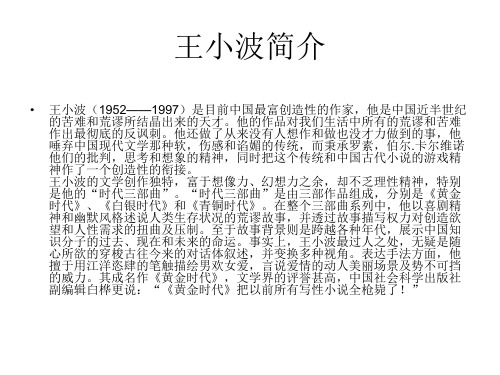
• 小波(1952-1997),1952年出生于北京,并先后当过知青、民办教 师、工人、工科大学生。其后,王小波在美国匹兹堡大学取得文学硕 士,再学电脑,于统计系当助教,回国后在中国人民大学任教。 1980年,他与李银河结婚。 • • 1995年,王小波的成名作《黄金时代》被当局查禁,甚至不准在国 营的新华书店摆卖,可是却受广大的读者和文学评论家赞赏。事实上, 《黄金时代》在个体户书摊上已经售出六万多册,并且出版了台湾版 和香港版,对此,《人民日报》海外版亦不得不承认:“这部小说无 论在国内还是海外,偶一露面总会造成排队阅读的局面。”他唯一一 部电影剧本《东宫.西宫》获阿根廷国际电影节最佳编剧奖,并且荣 膺1997年的戛纳国际电影节入围作品,使王小波成为在国际电影节 为中国取得最佳编剧奖的第一人。 • 1997年4月10日在北京因心脏病猝死的王小波,被誉为中国的乔依斯 兼卡夫卡,亦是唯一一位两次获得世界华语文学界的重要奖项“台湾 联合报系文学奖中篇小说大奖”的中国大陆作家。
• 他的小说其实一直不大被出版社接受,也是因为文章中的性描写。其 实这些文字不如贾平凹等人的小脚文学来的露骨,也不如其它人如莫 言写的一样媚俗,只是比较直率罢了。在新时期文学领域中,性禁忌 依然存在,这原因涉及到中国人的文化传统、社会心理、伦理价值等 一些更深的层面。 抛开以上热点不谈,从没有看到有人用这样的笔法写作。在王的小说 中,你可以看到,历来文学所谓真实性的规则全都被从容跨越了,他 用了不同的修辞方式来写小说,大量的即兴发挥、错位的角色语体, 寓庄于谐,寓文雅于粗野。读者可以在其中感受澎湃的想象力。 王大多数以第一人称叙事,而这个人总是个生活中不顺心、受委屈的 家伙。他幽默机敏,理性清澈,在内心状态和角色地位上最接近游离 于主流的个体知识分子,这种性格的叙事者,也有易于辨识的语言风 格。王本身是个“能文能武”的人,曾是个知识青年(我最佩服的一 代),上山下乡过,赴美深造过——他的本职是个名牌大学数学讲师, 写这一手好文不输任何敢称大师的人,这种角色在中国文坛上也是绝 无仅有的。
尼克松:沉默的大多数(Richa...

尼克松:沉默的大多数(Richa...第一篇:尼克松:沉默的大多数(Richard M. Nixon The Great Silent Majority)Good evening, my fellow Americans.T onight I want to talk to you on a subject of deepconcern to all Americans and to many people in all partsof the world, the war in Vietnam.I believe that one of the reasons for the deep divisionabout Vietnam is that many Americans have lostconfidence in what their Government has told them about our policy.The American people cannot and should not be asked to support a policy which involves the overridingissues of war and peace unless they know the truth aboutthat policy.T onight, therefore, I would like to answer some of thequestions that I know are on the minds of many of youlistening to me.How and why did America get involved in Vietnam in thefirst place?How has this administration changed the policy of theprevious Administration?What has really happened in the negotiations in Parisand on the battlefront in Vietnam?What choices do we have if we are to end the war?What are the prospects for peace?Now let me begin by describing the situation I foundwhen I was inaugurated on January 20: The war had beengoing on for four years.Thirty-one thousand Americanshad been killed in action.The training program for theSouth Vietnamese was beyond [behind] schedule.Fivehundred and forty-thousand Americans were in Vietnamwith no plans to reduce the number.No progress had been made at the negotiations in Paris and the United Stateshad not put forth a comprehensive peace proposal.The war was causing deep division at home and criticismfrom many of our friends, as well as our enemies, abroad.In view of these circumstances, there were some whourged that I end the war at once by ordering theimmediate withdrawal of all American forces.From apolitical standpoint, this would have been a popular andeasy course to follow.After all, we became involved inthe war while my predecessor was in office.I couldblame the defeat, which would be the result of myaction, on him--and come out as the peacemaker.Someput it to me quite bluntly: This was the only way toavoid allowing Johnson's war to become Nixon's war.But I had a greater obligation than to think only of theyears of my Administration, and of the next election.Ihad to think of the effect of my decision on the nextgeneration, and on the future of peace and freedom inAmerica, and in the world.Let us all understand that the question before us is notwhether some Americans are for peace and some Americans are against peace.The question at issue is not whetherJohnson's war becomes Nixon's war.The great questionis: How can we win America's peace?Well, let us turn now to the fundamental issue: Why andhow did the United States become involved in Vietnam inthe first place? Fifteen years ago North Vietnam, withthe logistical support of Communist China and the SovietUnion, launched a campaign to impose a Communistgovernment on South Vietnam by instigating andsupporting a revolution.In response to the request of the Government of SouthVietnam, President Eisenhower sent economic aid andmilitary equipment to assist the people of South Vietnamin their efforts to prevent a Communist takeover.Sevenyears ago, President Kennedy sent 16,000 militarypersonnel to Vietnam as combat advisers.Four years ago,President Johnson sent American combat forces to South Vietnam.Now many believe that President Johnson's decision tosend American combat forces to South Vietnam was wrong.And many others, I among them, have been strongly critical of the way the war has been conducted.But the question facing us today is: Now that we are inthe war, what is the best way to end it?In January I could only conclude that the precipitatewithdrawal of all American forces from Vietnam would bea disaster not only for South Vietnam but for the UnitedStates and for the cause of peace.For the South Vietnamese, our precipitate withdrawalwould inevitably allow the Communists to repeat themassacres which followed their takeover in the North 15years before.They then murdered more than 50,000 people and hundreds of thousands more died in slave laborcamps.We saw a prelude of what would happen in South Vietnamwhen the Communists entered the city of Hue lastyear.During their brief rule there, there was a bloody reign of terror in which 3,000 civilians were clubbed, shot todeath, and buried in mass graves.With the sudden collapse of our support, theseatrocities at Hue would become the nightmare of theentire nation and particularly for the million-and-ahalf Catholic refugees who fled to South Vietnam whenthe Communists took over in the North.For the United States this first defeat in our nation'shistory would result in a collapse of confidence inAmerican leadership not only in Asia but throughout theworld.Three American Presidents have recognized the great stakes involved in Vietnam and understood what had to be done.In 1963 President Kennedy with his characteristiceloquence and clarity said,“We want to see a stable Government there,” carrying onthe [a] struggle to maintain its national independence.“We believe strongly in that.We are not going towithdraw from that effort.In my opinion, for us towithdraw from that effort would mean a collapse not only of South Vietnam but Southeast Asia.So we're going tostay there.”? President Eisenhower and President Johnson expressed thesame conclusion during their terms of office.For the future of peace, precipitate withdrawal would bea disaster of immense magnitude.A nation cannot remaingreat if it betrays its allies and lets down itsfriends.Our defeat and humiliation in South Vietnamwithout question would promote recklessness in thecouncils of those great powers who have not yetabandoned their goals of worlds conquest.This wouldspark violence wherever our commitments help maintainthe peace--in the Middle East, in Berlin, eventuallyeven in the Western Hemisphere.Ultimately, this wouldcost more lives.It would not bring peace.It wouldbring more war.For these reasons I rejected the recommendation that Ishould end the war by immediately withdrawing all of our forces.I chose instead to change American policy onboth the negotiating front and the battle front in orderto end the war fought on many fronts.I initiated apursuit for peace on many fronts.In a television speechon May 14, in a speech before the United Nations, on anumber of other occasions, I set forth our peaceproposals in great detail.We have offered the complete withdrawal of all outsideforces within one year.We have proposed a cease fireunder international supervision.We have offered freeelections under international supervision with theCommunists participating in the organization and conduct of the elections as an organized political force.Andthe Saigon government has pledged to accept the resultof the election.We have not put forth our proposals on a take-it-or-leave-it basis.We have indicated that we're willing todiscuss the proposals that have been put forth by theother side.We have declared that anything isnegotiable, except the right of the people of SouthVietnam to determine their own future.At the Paris peace conference Ambassador Lodge hasdemonstrated our flexibility and good faith in 40 publicmeetings.Hanoi has refused even to discuss ourproposals.They demand our unconditional acceptance oftheir terms which are that we withdraw all Americanforces immediately and unconditionally and that weoverthrow the government of South Vietnam as we leave.We have not limited our peace initiatives to publicforums and public statements.I recognized in Januarythat a long and bitter war like this usually cannot besettled in a public forum.That is why in addition tothe public statements and negotiations, I have exploredevery possible private avenue that might lead to asettlement.Tonight, I am taking the unprecedented step of disclosing to you some of our other initiatives forpeace, initiatives we undertook privately and secretlybecause we thought we thereby might open a door which publicly would be closed.I did not wait for my inauguration to begin my quest forpeace.Soon after my election, through an individual whowas directly in contact on a personal basis with theleaders of North Vietnam, I made two private offers fora rapid, comprehensive settlement.Hanoi's repliescalled in effect for our surrender before negotiations.Since the Soviet Union furnishes most of the militaryequipment for North Vietnam, Secretary of State Rogers,my assistant for national security affairs, Dr.Kissinger, Ambassador Lodge and I personally have met ona number of occasions with representatives of the SovietGovernment to enlist their assistance in gettingmeaningful negotiations started.In addition, we havehad extended discussions directed toward that same endwith representatives of other governments which havediplomatic relations with North Vietnam.None of these initiatives have to date produced results.In mid-July I became convinced that it was necessary tomake a major move to break the deadlock in the Paristalks.I spoke directly in this office, where I?m nowsitting, with an individual who had known Ho Chi Minh ona personal basis for 25 years.Through him I sent aletter to Ho Chi Minh.I did this outside of the usualdiplomatic channels with the hope that with thenecessity of making statements for propaganda removed,there might be constructive progress toward bringing the war to an end.Let me read from that letter to you now:Dear Mr.President:I realize that it is difficult to communicatemeaningfully across the gulf of four years of war.Butprecisely because of this gulf I wanted to take thisopportunity to reaffirm in all solemnity my desire towork for a just peace.I deeply believe that the war inVietnam has gone on too long and delay in bringing it toan end can benefit no one, least of all the people ofVietnam.The time has come to move forward at theconference table toward an early resolution of thistragic war.You will find us forthcoming and open-mindedin a common effort to bring the blessings of peace tothe brave people of Vietnam.Let history record that atthis critical juncture both sides turned their facetoward peace rather than toward conflict and war."I received Ho Chi Minh's reply on August 30, three daysbefore his death.It simply reiterated the publicposition North Vietnam had taken at Paris and flatlyrejected my initiative.The full text of both letters isbeing released to the press.In addition to the public meetings that I have referredto, Ambassador Lodge has met with Vietnam's chiefnegotiator in Paris in 11 private sessions.And we havetaken other significant initiatives which must remainsecret to keep open some channels of communicationswhich may still prove to be productive.But the effect of all the public, private, and secretnegotiations which have been undertaken since thebombing halt a year ago, and since this Administrationcame into office on January 20th, can be summed up inone sentence: No progress whatever has been made except agreement on the shape of the bargaining table.Well, now, who's at fault? It's become clear that theobstacle in negotiating an end to the war is not thePresident of the United States.It is not the SouthVietnamese Government.The obstacle is the other side'sabsolute refusal to show the least willingness to joinus in seeking a just peace.And it will not do so whileit is convinced that all it has to do is to wait for ournext concession, and our next concession after that one,until it gets everything it wants.There can now be no longer any question that progress innegotiation depends only on Hanoi 's deciding tonegotiate--to negotiate seriously.I realize that thisreport on our efforts on the diplomatic front isdiscouraging to the American people, but the Americanpeople are entitled to know the truth--the bad news aswell as the good news--where the lives of our youngmen are involved.Now let me turn, however, to a more encouraging reporton another front.At the time we launched our search forpeace, I recognized we might not succeed in bringing anend to the war through negotiations.I therefore putinto effect another plan to bring peace--a plan whichwill bring the war to an end regardless of what happenson the negotiating front.It is in line with the majorshift in U.S.foreign policy which I described in mypress conference at Guam on July 25.Let me brieflyexplain what has been described as the Nixon Doctrine--a policy which not only will help end the war in Vietnambut which is an essential element of our program toprevent future Vietnams.We Americans are a do-it-yourself people--we're animpatient people.Instead of teaching someone else todo a job, we like to do it ourselves.And this traithas been carried over into our foreign policy.In Korea,and again in Vietnam, the United States furnished mostof the money, most of the arms, and most of the men tohelp the people of those countries defend their freedomagainst Communist aggression.Before any American troops were committed to Vietnam, aleader of another Asian country expressed this opinionto me when I was traveling in Asia as a private citizen.He said: ?When you are trying to assist another nationdefend its freedom, U.S.policy should be to help themfight the war, but not to fight the war for them.? Well inaccordance with this wise counsel, I laid downin Guam three principles as guidelines for futureAmerican policy toward Asia.First, the United Stateswill keep all of its treaty commitments.Second, weshall provide a shield if a nuclear power threatens thefreedom of a nation allied with us, or of a nation whosesurvival we consider vital to our security.Third, incases involving other types of aggression we shallfurnish military and economic assistance when requestedin accordance with our treaty commitments.But we shalllook to the nation directly threatened to assume theprimary responsibility of providing the manpower for itsdefense.After I announced this policy, I found that the leadersof the Philippines, Thailand, Vietnam, South Korea,other nations which might be threatened by Communistaggression, welcomed this new direction in Americanforeign policy.The defense of freedom is everybody's business--notjust America's business.And it is particularly theresponsibility of the people whose freedom isthreatened.In the previous Administration, weAmericanized the war in Vietnam.In this Administration,we are Vietnamizing the search for peace.The policy of the previous Administration not onlyresulted in our assuming the primary responsibility forfighting the war, but even more significant did notadequately stress the goal of strengthening the SouthVietnamese so that they could defend themselves when we left.The Vietnamization plan was launched followingSecretaryLaird's visit to Vietnam in March.Under the plan, Iordered first a substantial increase in the training andequipment of South Vietnamese forces.In July, on myvisit to Vietnam, I changed General Abrams's orders, sothat they were consistent with the objectives of our newpolicies.Under the new orders, the primary mission ofour troops is to enable the South Vietnamese forces toassume the full responsibility for the security of SouthVietnam.Our air operations have been reduced by over 20 per cent.And now we have begun to see the results of this long-overdue change in American policy in Vietnam.After fiveyears of Americans going into Vietnam we are finallybringing American men home.By December 15 over 60,000 men will have been withdrawn from South Vietnam,including 20 percent of all of our combat forces.TheSouth Vietnamese have continued to gain in strength.Asa result, they've been able to take over combatresponsibilities from our American troops.Two other significant developments have occurred sincethis Administration took office.Enemy infiltration,infiltration which is essential if they are to launch amajor attack over the last three months, is less than 20percent of what it was over the same period last year.And most important, United States casualties havedeclined during the last two months to the lowest pointin three years.Let me now turn to our program for the future.We haveadopted a plan which we have worked out in cooperationwith the South Vietnamese for the complete withdrawal of all bat ground forces and their replacement bySouth Vietnamese forces on an orderly scheduledtimetable.This withdrawal will be made from strengthand not from weakness.As South Vietnamese forces become stronger, the rate of American withdrawal can becomegreater.I have not, and do not, intend to announce the timetablefor our program, and there are obvious reasons for thisdecision which I?m sure you will understand.As I?veindicated on several occasions, the rate of withdrawalwill depend on developments on three fronts.One ofthese is the progress which can be, or might be, made inthe Paris talks.An announcement of a fixed timetablefor our withdrawal would completely remove any incentive for the enemy to negotiate an agreement.They wouldsimply wait until our forces had withdrawn and then move in.The other two factors on which we will base ourwithdrawal decisions are the level of enemy activity andthe progress of the training programs of the SouthVietnamese forces.And I am glad to be able to reporttonight progress on both of these fronts has beengreater than we anticipated when we started the program in June for withdrawal.As a result, our timetable forwithdrawal is more optimistic now than when we made our first estimates in June.Now this clearly demonstrates why it is not wise to befrozen in on a fixed timetable.We must retain theflexibility to base each withdrawal decision on thesituation as it is at that time, rather than onestimates that are no longer valid.Along with thisoptimistic estimate, I must in all candor leave one noteof caution.If the level of enemy activity significantlyincreases, we might have to adjust our timetableaccordingly.However, I want the record to be completely clear on onepoint.At the time of the bombing halt just a year agothere was some confusion as to whether there was anunderstanding on the part of the enemy that if westopped the bombing of North Vietnam, they would stopthe shelling of cities in South Vietnam.I want to be sure that there is no misunderstanding onthe part of the enemy with regard to our withdrawalprogram.We have noted the reduced level ofinfiltration, the reduction of our casualties and arebasing our withdrawal decisions partially on thosefactors.If the level of infiltration or our casualtiesincrease while we are trying to scale down the fighting,it will be the result of a conscious decision by theenemy.Hanoi could make no greater mistake than toassume that an increase in violence will be to itsadvantage.If I conclude that increased enemy action jeopardizesour remaining forces in Vietnam, I shall not hesitate totake strong and effective measures to deal with thatsituation.This is not a threat.This is a statement ofpolicy which as Commander-in-Chief of our armed forces I am making and meeting my responsibility for theprotection of American fighting men wherever they maybe.My fellow Americans, I am sure you can recognize fromwhat I have said that we really only have two choicesopen to us if we want to end this war.I can order animmediate precipitate withdrawal of all Americans fromVietnam without regard to the effects of that action.Orwe can persist in our search for a just peace through anegotiated settlement, if possible, or through continuedimplementation of our plan for Vietnamization, ifnecessary--a plan in which we will withdraw all of ourforces from Vietnam on a schedule in accordance with our program as the South Vietnamese become strong enough to defend their own freedom.I have chosen this second course.It is not the easyway.It is the right way.It is a plan which will endthe war and serve the cause of peace, not just inVietnam but in the Pacific and in the world.In speaking of the consequences of a precipitouswithdrawal, I mentioned that our allies would loseconfidence in America.Far more dangerous, we would lose confidence in ourselves.Oh, the immediate reactionwould be a sense of relief that our men were cominghome.But as we saw the consequences of what we haddone, inevitable remorse and divisive recriminationwould scar our spirit as a people.We have faced other crises in our history and we havebecome stronger by rejecting the easy way out and taking the right way in meeting our challenges.Our greatnessas a nation has been our capacity to do what has to bedone when we knew our course was right.I recognize thatsome of my fellow citizens disagree with the plan forpeace I have chosen.Honest and patriotic Americans havereached different conclusions as to how peace should beachieved.In San Francisco a few weeks ago, I sawdemonstrators carrying signs reading, ?Lose in Vietnam,bring the boys home.?Well, one of the strengths of our free society is that any American has a right to reachthat conclusion and to advocate that point of view.But as President of the United States, I would be untrueto my oath of office if I allowed the policy of thisnation to be dictated by the minority who hold thatpoint of view and who try to impose it on the nation bymounting demonstrations in the street.For almost 200years, the policy of this nation has been made under ourConstitution by those leaders in the Congress and theWhite House elected by all the people.If a vocalminority, however fervent its cause, prevails overreason and the will of the majority, this nation has nofuture as a free society.And now, I would like to address a word, if I may, tothe young people of this nation who are particularlyconcerned, and I understand why they are concerned,about this war.I respect your idealism.I share yourconcern for peace.I want peace as much as you do.Thereare powerful personal reasons I want to end this war.This week I will have to sign 83 letters to mothers,fathers, wives, and loved ones of men who have giventheir lives for America in Vietnam.It's very littlesatisfaction to me that this is only one-third as manyletters as I signed the first week in office.There isnothing I want more than to see the day come when I donot have to write any of those letters.I want to end the warto save the lives of those braveyoung men in Vietnam.But I want to end it in a waywhich will increase the chance that their youngerbrothers and their sons will not have to fight in somefuture Vietnam some place in the world.And I want to end the war for another reason.I want toend it so that the energy and dedication of you, ouryoung people, now too often directed into bitter hatredagainst those responsible for the war, can be turned tothe great challenges of peace, a better life for allAmericans, a better life for all people on this earth.I have chosen a plan for peace.I believe it willsucceed.If it does not succeed, what the critics saynow won?t matter.Or if it does succeed, what thecritics say now won?t matter.If it does not succeed,anything I say then won?t matter.I know it may not be fashionable to speak of patriotismor national destiny these days, but I feel it isappropriate to do so on this occasion.Two hundred yearsago this nation was weak and poor.But even then,America was the hope of millions in the world.Today wehave become the strongest and richest nation in theworld, and the wheel of destiny has turned so that anyhope the world has for the survival of peace and freedomwill be determined by whether the American people havethe moral stamina and the courage to meet the challengeof free-world leadership.Let historians not record that, when America was themost powerful nation in the world, we passed on theother side of the road and allowed the last hopes forpeace and freedom of millions of people to be suffocatedby the forces of totalitarianism.So tonight, to you, the great silent majority of myfellow Americans, I ask for your support.I pledged inmy campaign for the Presidency to end the war in a waythat we could win the peace.I have initiated a plan ofaction which will enable me to keep that pledge.Themore support I can have from the American people, thesooner that pledge can be redeemed.For the more divided we are at home, the less likely the enemy is tonegotiate at Paris.Let us be united for peace.Let us also be unitedagainst defeat.Because let us understand--NorthVietnam cannot defeat or humiliate the United States.Only Americans can do that.Fifty years ago, in this room, and at this very desk,President Woodrow Wilson spoke words which caught theimagination of a war-weary world.He said: ?This is thewar to end wars.? His dream for peace after World War Iwas shattered on the hard reality of great powerpolitics.And Woodrow Wilson died a broken man.Tonight, I do not tell you that the war in Vietnam isthe war to end wars, but I do say this: I have initiateda plan which will end this war in a way that will bringus closer to that great goal to which--to whichWoodrow Wilson and every American President in ourhistory has been dedicated--the goal of a just andlasting peace.As President I hold the responsibility for choosing thebest path for that goal and then leading the nationalong it.I pledge to you tonight that I shall meet thisresponsibility with all of the strength and wisdom I cancommand, in accordance with your hopes, mindful of your concerns, sustained by your prayers.Thank you and good night.第二篇:名人演讲:尼克松:沉默的大多数 The Great Silent[推荐] Richard M.Nixon The Great Silent Majority delivered 3 November 1969Good evening, my fellow Americans T onight I want to talk to you on a subject of deep concern to all Americans and to many people in all parts of the world, the war in Vietnam.I believe that one of the reasons for the deep division about Vietnam is that many Americans have lost confidence in what their Government has told them about our policy.The American people cannot and should not be asked to support a policy which involves the overriding issues of war and peace unless they know the truth about that policy.T onight, therefore, I would like to answer some of the questions that I know are on the minds of many of you listening to me.How and why did America get involved in Vietnam in the first place?How has this administration changed the policy of the previous Administration?What has really happened in the negotiations in Paris and on the battlefront in Vietnam?What choices do we have if we are to end the war?What are the prospects for peace?Now let me begin by describing the situation I found when I was inaugurated on January 20: The war had been going on for four years.Thirty-one thousand Americans had been killed in action.The training program for the South Vietnamese was。
《沉默的大多数》好句好段读书摘抄
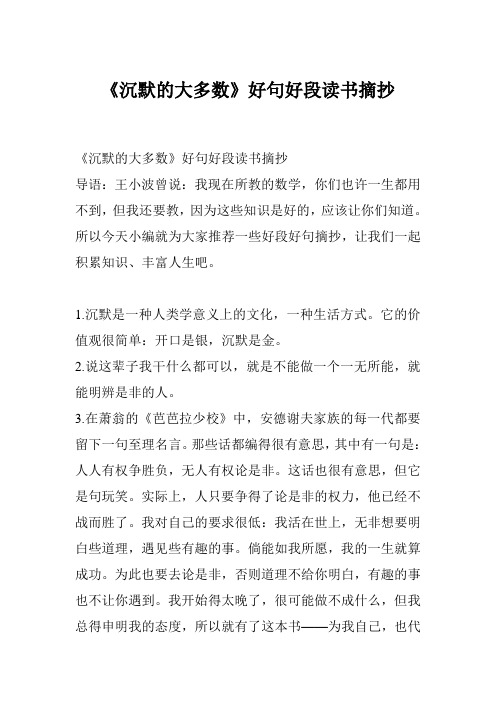
《沉默的大多数》好句好段读书摘抄《沉默的大多数》好句好段读书摘抄导语:王小波曾说:我现在所教的数学,你们也许一生都用不到,但我还要教,因为这些知识是好的,应该让你们知道。
所以今天小编就为大家推荐一些好段好句摘抄,让我们一起积累知识、丰富人生吧。
1.沉默是一种人类学意义上的文化,一种生活方式。
它的价值观很简单:开口是银,沉默是金。
2.说这辈子我干什么都可以,就是不能做一个一无所能,就能明辨是非的人。
3.在萧翁的《芭芭拉少校》中,安德谢夫家族的每一代都要留下一句至理名言。
那些话都编得很有意思,其中有一句是:人人有权争胜负,无人有权论是非。
这话也很有意思,但它是句玩笑。
实际上,人只要争得了论是非的权力,他已经不战而胜了。
我对自己的要求很低:我活在世上,无非想要明白些道理,遇见些有趣的事。
倘能如我所愿,我的一生就算成功。
为此也要去论是非,否则道理不给你明白,有趣的事也不让你遇到。
我开始得太晚了,很可能做不成什么,但我总得申明我的态度,所以就有了这本书——为我自己,也代表沉默的大多数。
序言----王小波4.在这世界上的一切人之中,我最希望予以提升的一个,就是我自己。
5.假设善恶是可以判断的,那么明辨是非的前提就是发展智力,增广知识。
然而,你劝一位自以为已经明辨是非的人发展智力,增广见识,他总会觉得你让他舍近求远,不仅不肯,还会心生怨恨。
我不愿为这样的小事去得罪人。
----王小波6.现在的年轻人大概常听人说,人有知识就会变聪明,会活得更好,不受人欺。
这话虽不错,但也有偏差。
知识另有一种作用,它可以使你生活在过去、未来和现在,使你的生活变得更充实、更有趣。
这其中另有一种境界,非无知的人可解。
不管有没有直接的好处,都应该学习——持这种态度来求知更可取。
7.凭良心说,我喜欢千奇百怪的结果--我把这叫做浪漫。
----王小波8.学术界就是这样的局面,所以我们劝年轻人从事学术时总要说:要耐得住寂寞。
好像劝寡妇守空房一样。
名人演讲:尼克松:沉默的大多数TheGreatSilent[推荐]
![名人演讲:尼克松:沉默的大多数TheGreatSilent[推荐]](https://img.taocdn.com/s3/m/42182cf581eb6294dd88d0d233d4b14e85243e61.png)
名人演讲:尼克松:沉默的大多数TheGreatSilent[推荐]第一篇:名人演讲:尼克松:沉默的大多数 The Great Silent[推荐] Richard M.Nixon The Great Silent Majority delivered 3 November 1969Good evening, my fellow Americans T onight I want to talk to you on a subject of deep concern to all Americans and to many people in all parts of the world, the war in Vietnam.I believe that one of the reasons for the deep division about Vietnam is that many Americans have lost confidence in what their Government has told them about our policy.The American people cannot and should not be asked to support a policy which involves the overriding issues of war and peace unless they know the truth about that policy.T onight, therefore, I would like to answer some of the questions that I know are on the minds of many of you listening to me.How and why did America get involved in Vietnam in the first place?How has this administration changed the policy of the previous Administration?What has really happened in the negotiations in Paris and on the battlefront in Vietnam?What choices do we have if we are to end the war?What are the prospects for peace?Now let me begin by describing the situation I found when I was inaugurated on January 20: The war had been going on for four years.Thirty-one thousand Americans had been killed in action.The training program for the South Vietnamese was beyond [behind] schedule.Five hundred and forty-thousand Americans were in Vietnam with no plans to reduce the number.No progress had been made at the negotiations in Parisand the United States had not put forth a comprehensive peace proposal.The war was causing deep division at home and criticism from many of our friends, as well as our enemies, abroad.In view of these circumstances, there were some who urged that I end the war at once by ordering the immediate withdrawal of all American forces.From a political standpoint, this would have been a popular and easy course to follow.After all, we became involved in the war while my predecessor was in office.I could blame the defeat, which would be the result of my action, on him--and come out as the peacemaker.Some put it to me quite bluntly: This was the only way to avoid allowing Johnson’s war to become Nixon’s war.But I had a gr eater obligation than to think only of the years of my Administration, and of the next election.I had to think of the effect of my decision on the next generation, and on the future of peace and freedom in America, and in the world.Let us all understand that the question before us is not whether some Americans are for peace and some Americans are against peace.The question at issue is not whether Johnson’s war becomes Nixon’s war.The great question is: How can we win America’s peace?Well, let us turn now to the fundamental issue: Why and how did the United States become involved in Vietnam in the first place? Fifteen years ago North Vietnam, with the logistical support of Communist China and the Soviet Union, launched a campaign to impose a Communist government on South Vietnam by instigating and supporting a revolution.In response to the request of the Government of South Vietnam, President Eisenhower sent economic aid and military equipment to assist the people of South Vietnam in their efforts to prevent a Communist takeover.Seven years ago, President Kennedy sent16,000 military personnel to Vietnam as combat advisers.Four years ago, President Johnson sent American combat forces to South Vietnam.Now many believe that President Johnson’s decision to send American combat forces to South Vietnam was wrong.And many others, I among them, have been strongly critical of the way the war has been conducted.But the question facing us today is: Now that we are in the war, what is the best way to end it?In January I could only conclude that the precipitate withdrawal of all American forces from Vietnam would be a disaster not only for South Vietnam but for the United States and for the cause of peace.For the South Vietnamese, our precipitate withdrawal would inevitably allow the Communists to repeat the massacres which followed their takeover in the North 15 years before.They then murdered more than 50,000 people and hundreds of thousands more died in slave labor camps.We saw a prelude of what would happen in South Vietnam when the Communists entered the city of Hue last year.During their brief rule there, there was a bloody reign of terror in which 3,000 civilians were clubbed, shot to death, and buried in mass graves.With the sudden collapse of our support, these atrocities at Hue would become the nightmare of the entire nation and particularly for the million-and-a half Catholic refugees who fled to South Vietnam when the Communists took over in the North.For the United States this first defeat in our nation’s history would result in a collapse of confidence in American leadership not only in Asia but throughout the world.Three American Presidents have recognized the great stakes involved in Vietnam and understood what had to be done.In 1963 President Kennedy with his characteristic eloquence and claritysaid,“We want to see a stable Government there,” carrying on the [a] struggle to maintain its national independence.“ We believe strongly in that.We are not going to withdraw from that effort.In my opinion, for us to withdraw from that effort would mean a collapse not only of South Vietnam but Southeast Asia.So we’re going to stay there.”President Eisenhower and President Johnson expressed the same conclusion during their terms of office.For the future of peace, precipitate withdrawal would be a disaster of immense magnitude.A nation cannot remain great if it betrays its allies and lets down its friends.Our defeat and humiliation in South Vietnam without question would promote recklessness in the councils of those great powers who have not yet abandoned their goals of worlds conquest.This would spark violence wherever our commitments help maintain the peace--in the Middle East, in Berlin, eventually even in the Western Hemisphere.Ultimately, this would cost more lives.It would not bring peace.It would bring more war.For these reasons I rejected the recommendation that I should end the war by immediately withdrawing all of our forces.I chose instead to change American policy on both the negotiating front and the battle front in order to end the war fought on many fronts.I initiated a pursuit for peace on many fronts.In a television speech on May 14, in a speech before the United Nations, on a number of other occasions, I set forth our peace proposals in great detail.We have offered the complete withdrawal of all outside forces within one year.We have proposed a cease fire under international supervision.We have offered free elections under international supervision with the Communists participating in the organization and conduct of the elections as an organized political force.And the Saigon government haspledged to accept the result of the election.We have not put forth our proposals on a take-it-or-leave-it basis.We have indicated that we’re willing to discuss the proposal s that have been put forth by the other side.We have declared that anything is negotiable, except the right of the people of South Vietnam to determine their own future.第二篇:沉默的大多数沉默的大多数中国乡村一瞥2005年4月7日|山东北河村|打印版中国总人口的60%,即8亿人口,生活在农村,日收入不足一美元。
沉默的大多数
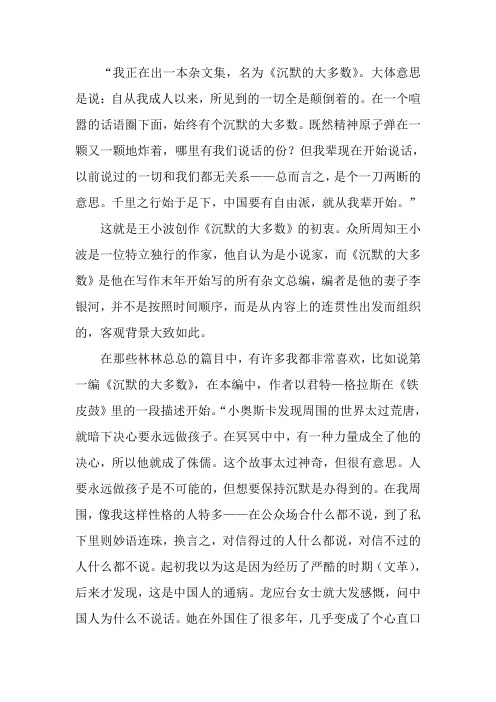
“我正在出一本杂文集,名为《沉默的大多数》。
大体意思是说:自从我成人以来,所见到的一切全是颠倒着的。
在一个喧嚣的话语圈下面,始终有个沉默的大多数。
既然精神原子弹在一颗又一颗地炸着,哪里有我们说话的份?但我辈现在开始说话,以前说过的一切和我们都无关系——总而言之,是个一刀两断的意思。
千里之行始于足下,中国要有自由派,就从我辈开始。
”这就是王小波创作《沉默的大多数》的初衷。
众所周知王小波是一位特立独行的作家,他自认为是小说家,而《沉默的大多数》是他在写作末年开始写的所有杂文总编,编者是他的妻子李银河,并不是按照时间顺序,而是从内容上的连贯性出发而组织的,客观背景大致如此。
在那些林林总总的篇目中,有许多我都非常喜欢,比如说第一编《沉默的大多数》,在本编中,作者以君特—格拉斯在《铁皮鼓》里的一段描述开始。
“小奥斯卡发现周围的世界太过荒唐,就暗下决心要永远做孩子。
在冥冥中中,有一种力量成全了他的决心,所以他就成了侏儒。
这个故事太过神奇,但很有意思。
人要永远做孩子是不可能的,但想要保持沉默是办得到的。
在我周围,像我这样性格的人特多——在公众场合什么都不说,到了私下里则妙语连珠,换言之,对信得过的人什么都说,对信不过的人什么都不说。
起初我以为这是因为经历了严酷的时期(文革),后来才发现,这是中国人的通病。
龙应台女士就大发感慨,问中国人为什么不说话。
她在外国住了很多年,几乎变成了个心直口快的外国人。
她把保持沉默看做是懦弱,但这是不对的。
沉默是一种生活方式!”在这一编中,作者用了好几个连续的例子说明了各种各样的“沉默”。
这样的沉默,其实是一种逃避,是一种“各扫自家房前雪,莫管他人瓦上霜”的冷漠。
五千年的封建社会,帝王将相“确有种乎”的格局在普天之下的老百姓心中留下太深的烙印。
一代代中华儿女就这样用那面朝黄土,背朝天的姿势,耕耘着岁月交替,演绎着时代更迭。
上有秦始皇灭六国一统天下,焚书坑儒;下有清朝文字狱盛行!普通百姓不能乱说,说错了诛你九族;文人更不能多说,乱说了抽你脊骨、封你喉骨!就在这岁岁年年,年年岁岁中,中国人早已适应了听命于天、听命于地、听命于人!多听少说,话多则不灵,这些教条早已深入人心!而这样的结果是什么大家都不敢说真话了,特别是庸庸大众中那些所谓的笔者,“……但照我的标准,那不是说话,而是上着一种话语的捐税。
- 1、下载文档前请自行甄别文档内容的完整性,平台不提供额外的编辑、内容补充、找答案等附加服务。
- 2、"仅部分预览"的文档,不可在线预览部分如存在完整性等问题,可反馈申请退款(可完整预览的文档不适用该条件!)。
- 3、如文档侵犯您的权益,请联系客服反馈,我们会尽快为您处理(人工客服工作时间:9:00-18:30)。
(二)对中等生管理的情感忽略
教师的“教育爱”集中体现为对学生的关爱。但班 主任在班级管理的过程中对学生产生的关爱不仅 仅是 “教育爱”,还带有很强的“个体”感情的色 彩,根据个人的好恶,很难对学生做到一视同仁。 (1)那些在某方面“突出”(遑论优点或是不足)的学 生都得到了班主任的不同形式、不同层次的关注, 也与班主任建立了各种各样的情感联系,而那些中 等生由于不“突出”而得不到班主任的关注,与班 主任发生的联系很少,与班主任建立的感情也很有 限,最容易被班主任所忽视。
让沉默的大多数活跃
——论班级中的中等生管理
课堂的三种学生: 班干部、学习成绩优异的学生 沉默的大多数(又称中等学生) —成绩中等,班级活动从属,遵守纪律 “后进生”、“问题学生”
一、“沉默的大多数”产生的原因 二、让“沉默的大多数”活跃
———班主任管理方式的转变
(一)班主任对中等生管理的力度不足
给予学生表演机会、拒绝向学生投入关注的目光 之时,在最根本的意义上,就是拒绝他作为一个有生 命力的个体的存在,是无视其生命存在特征的表现。 一个在教师、同伴面前,缺少表演机会或‘被看’ 机会的儿童,是天性被压抑而不得舒展的儿童。”
教师不仅应该尽量为“中等生”提供各种表现自 我的机会,而且对他们的进步和表现应给予适当的 表扬和鼓励(视而不见当然不该,但言过其实也会使 表扬适得其反);对他们的问题和不足也要及时指出 (这本身就是一种关心),帮助其改进;对他们的退缩、 被动要给予理解,不要急于求成。
是独特的、有价值的。多与学生沟通、交 往是学生学习积极性提高的重要保障,多用
爱心感化他们。爱是教师对学生进行教育 的重要动力,也是学生学习的重要能源。缺
少教师关爱的学生在学习中往往学习动力 不足,学习被动。
华东师范大学的李政涛曾经从生命角色生成和丰
富的角度论述过教师给学生提供表现机会对学生 生命发展的意义:“学生的生命发展,是以角色表演 为基础,在表演和观看中实现的。”“当教师拒绝
例2:“优秀班主任”
一个优秀班主任说,他的班级自习纪律特别好。 纪律好的标准是什是安静了。有人说,如果学生 遇到问题想问同学或老师怎么办?允许学生之间 讨论吗?他说:本来讨论问题是很好的,但是难 免有学生趁机谈话,影响班级纪律,于是就只有 要求所有学生自习课一律不能说话。于是班级纪 律很安静,学校检查评比印象很好,班主任工作 经常得到学校的表扬,于是一个优秀的班主任诞 生了。但是,学生就我们的教育过程中失去了锻 炼表达能力的机会。于是有人说,是教育制造了 “沉默的大多数”。
(一)管理方式:从被动到主动 (二)情感态度:从忽略到交往 (三)思想认识:从“顺其自然”到“提供机 会”
`
班级被动管理表现为“发现问题、解决 问题”的现状,主动深入学生的学习生活不 够,所以班主任应该主动了解学生的所思所 想,参与他们的喜怒哀乐,帮助他们把问题、 矛盾“禁于未发”。
让他(她)知道班主任关心他(她)、了解他 (她)、欣赏他(她),知道他(她)在班级里并非 可有可无的,知道他(她)虽然不是最优秀的但
(2)学生在情感上都渴望教师的关心和鼓励,“中等生”尤其如 此。
(三)对中等生思想认识的偏差
大多数班主任或多或少存在这样的认识:那 些“中等生”成绩都还过得去,不具备冲击 重点学校的实力,也没有差得让老师着急上 火,因此既不需特别辅导也不用特别操心,顺 其自然就可以;“中等生”智力、能力都普通, 没有突出的特长,也没有多少缺点;中等生缺 乏主见,比较从众,也没有挑战学校规章或社 会规则的胆量 。事实上这只是一种表象。
(1)“学习中等”掩盖了学生学习中的各种问题。
(
(3)中等生的听话、循规蹈矩只是在长期被忽 略之后的一种退缩。
“表达本身比表达的内容更有意义”
南朝刘勰说: “一言之辩,重于九鼎之宝; 三寸不烂之舌,强于百万之师。”
二、让“沉默的大多数”活跃 ———班主任管理方式的转变
